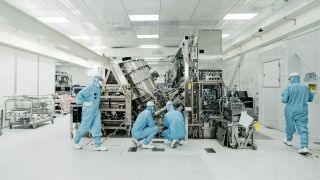ASML claims US ban on servicing China chipmaking tools will not hurt the company
Only a few Chinese fabs would be affected.

Peter Wennink, the outgoing chief executive of ASML said in an interview with Reuters that even if the U.S. government restricts the company from servicing some high-end chipmaking tools previously sold to Chinese customers, these limitations would not significantly impact ASML's financial outlook from 2025 to 2030, as only a few Chinese fabs would be affected.
Although China-based chipmakers cannot freely buy advanced wafer fab tools, Semiconductor Manufacturing International Corp. (SMIC) has procured and installed plenty of sophisticated machines and can now produce chips on 7nm-class (and perhaps even 5nm-class) manufacturing technologies. But these machines need servicing. Therefore, the U.S. government is now trying to persuade foreign governments to stop their chipmaking equipment firms from servicing these already installed tools, which will make them useless over time.
"We can service them, but not with U.S. content [which exports to China is restricted]," Wennink told Reuters. "But that's for a limited number of systems. But we can install them. Anything else that we have sold, we can install and service."
Installed base management (servicing, tweaking, and upgrading) brought ASML some €5.62 billion last year. It is hard to say how much money ASML earned servicing advanced DUV tools at SMIC, but services are a significant business.
Meanwhile, China was ASML's giant 'ship to' location in Q1 2024 and accounted for 49% of the company's revenue in geography. Virtually all lithography systems shipped to China are meant to make products on the so-called trailing nodes and do not currently fall under any restrictions. Thus, ASML will be able to service these tools for years.
In 2022, the U.S. implemented new export regulations mandating that U.S. companies and individuals obtain licenses to export equipment, technologies, and services for manufacturing advanced semiconductor components. These components include non-planar transistor logic chips at the 14nm/16nm nodes or smaller, 3D NAND with at least 128 layers, and DRAM memory chips with a half-pitch of 18nm or finer. Last year, Japan and the Netherlands followed suit and restricted exports of sophisticated WFE to China.
Additionally, American regulations prohibit U.S. citizens and green card holders from assisting in the development or production of integrated circuits at specific semiconductor fabrication plants located in China without appropriate licensing. As a result, American citizens at Chinese makers of wafer fab tools had to leave their jobs so as not to upset Uncle Sam. Now, the U.S. wants its allies to follow suit to hit the Chinese semiconductor sector again.
Stay On the Cutting Edge: Get the Tom's Hardware Newsletter
Get Tom's Hardware's best news and in-depth reviews, straight to your inbox.

Anton Shilov is a Freelance News Writer at Tom’s Hardware US. Over the past couple of decades, he has covered everything from CPUs and GPUs to supercomputers and from modern process technologies and latest fab tools to high-tech industry trends.
-
Co BIY This should come as little surprise.Reply
Most businesses would rather sell new products than service old ones. If you are in a near monopoly position then extending the useful life of your older products clearly competes with your new sales. -
CmdrShepard If that's what they think, then they are delusional. Probably just wishful thinking on their end designed to calm down investors and shareholders.Reply
Not performing your contractual obligations on already sold products because you were forced not to by a 3rd party is bad for business.
Who would want to buy from your company if someone else is going to dictate whether they will get support for their purchases or not? -
DavidMV ReplyCmdrShepard said:If that's what they think, then they are delusional. Probably just wishful thinking on their end designed to calm down investors and shareholders.
Not performing your contractual obligations on already sold products because you were forced not to by a 3rd party is bad for business.
Who would want to buy from your company if someone else is going to dictate whether they will get support for their purchases or not?
That was the agreement that allowed ASML to merge with a US company. Remember, half of ASML tech is American. ASML knew the risk.
Most Popular






